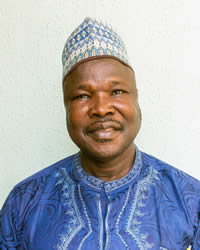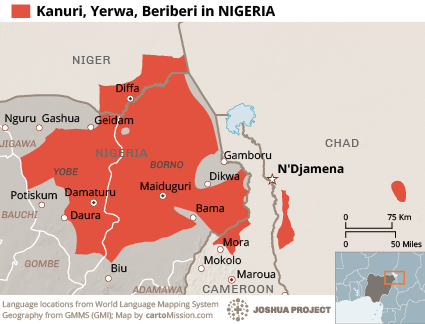The Kanuri tribes consist of the Yerwa Kanuri, the Manga Kanuri, and several other sub-tribes. Many Kanuri speak Hausa, Arabic, or another area language in addition to their Kanuri dialect. Yerwa is one of the Kanuri dialects.
The majority of the Yerwa Kanuri live in the Borno province of northeastern Nigeria, where they are the dominant people group. They are also located in the countries of Niger, Chad and Cameroon, and areas around Lake Chad. This region was once the powerful Borno Empire, ruled by the ancestors of the Kanuri. Others can be found in western Sudan.
The Kanuri began losing power in this region when the British took control in 1914. Nevertheless, they have remained politically active and still have much influence on the surrounding people groups. In fact, aspects of Kanuri culture, language, and religion have been adopted by many of the neighboring tribes.
Most of the Yerwa Kanuri are farmers; however, they usually practice some other occupation during the dry season. Those who farm raise millet as their staple crop, and supplement it with sorghum, corn, and peanuts. They raise sheep, goats and some horses. Among the Kanuri, horses are a symbol of prestige.
The Kanuri who live in cities are involved in government jobs, public service, construction, transportation, and commerce. The Yerwa Kanuri who have occupations that are related to politics or religion have a very high social status; whereas those who work as blacksmiths, well-diggers, or butchers have a low social status. The majority of the Yerwa Kanuri, however, are farmers, craftsmen and merchants.
Kanuri settlements vary in size; but most contain walled-in compounds surrounding several mud or grass houses with thatched, cone-shaped roofs. These houses are very cool during the hot months. Farmland surrounds each settlement.
Towns serve as local markets and administrative centers for the Yerwa Kanuri. They contain a local school and mosque. Attached to the mosque are smaller schools for religious teachings.
The household (not the family itself) is an important economic unit to the Yerwa Kanuri. The greater the number in a family, the more prestige the family head is given. For this reason young men are often loaned to households to help with field labor, to provide support, and to help in defending the family. In return, the head of the household will clothe the young man, feed him, pay his bride price, and possibly provide a bride for him. At that time, he will leave and start his own household. This type of relationship is widespread in Kanuri society. It is similar to the father-son relationship in that supreme loyalty and respect is given to the head of the household at all times.
Like most children, Yerwa Kanuri children often play games with each other. Even before puberty, children learn the roles they will take on when they reach maturity.
Kanuri men marry while they are in their early twenties. Polygamy is common and a man may have as many as four wives. Girls marry while they are in their teens. Ideally, a man wants his first wife to be a young virgin. However, the bride price for a virgin is very expensive, so men often take divorced women as their first wives. The divorce rate among the Kanuri is extremely high, with eight out of ten marriages ending in divorce.
The traditional Yerwa Kanuri dress consists of large robe-type garments that are worn with turbans or brightly embroidered caps. The large robes provide protection from the consistent heat. This attire is never worn while working out in the fields, but rather at festivals and Islamic ceremonies.
The Yerwa Kanuri have been Muslims since the eleventh century. The Koran emphasizes the importance of the family and the authority of the father. Women are considered inferior to men in the Islamic scriptures and are treated as such in Kanuri society.
Some folk beliefs are still practiced in conjunction with Islam. Charms and amulets are worn around the neck or in pockets for various reasons. There is a charm to ensure a good pregnancy for a mother. There is also one to keep the ghost of the dead from haunting its descendants.
Some Kanuri tribes have Bible translation needs in their dialect. For example, there is not a complete dialect for the Yerwa dialect.
Ask God to call people who are willing to go to Africa and share the love of Jesus with the Yerwa Kanuri.
Pray that God will use the small number of Yerwa Kanuri believers to share the gospel with their friends and families.
Ask God to raise up prayer teams who will begin breaking up the soil through intercession.
Pray that God will grant favor to mission agencies currently focusing on the Kanuri peoples.
Ask the Lord to raise up strong local churches among the Yerwa Kanuri.
Scripture Prayers for the Kanuri, Yerwa in Nigeria.
https://en.wikipedia.org/wiki/Kanuri_people
https://www.britannica.com/topic/Kanuri
https://www.101lasttribes.com/tribes/kanuri.html
https://face2faceafrica.com/article/here-is-whats-remarkable-about-the-kanuri-people-of-africa-a-race-of-gi
| Profile Source: Joshua Project |












